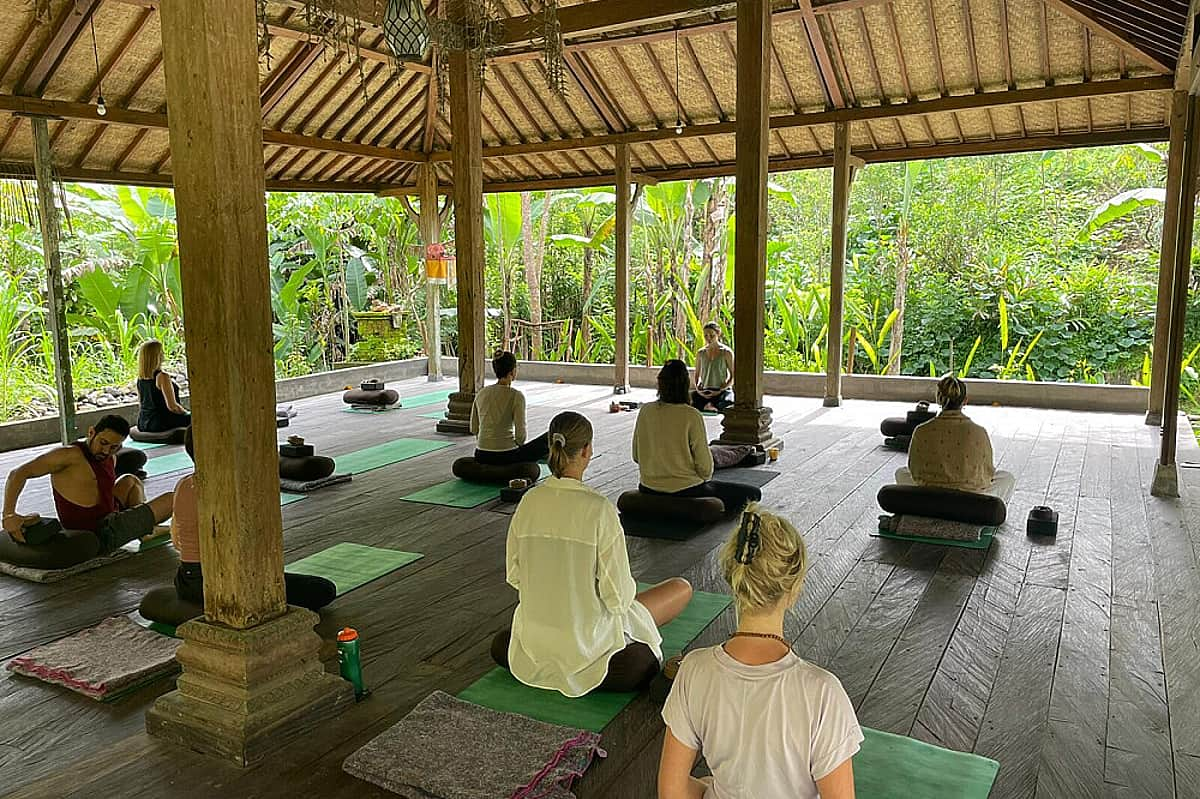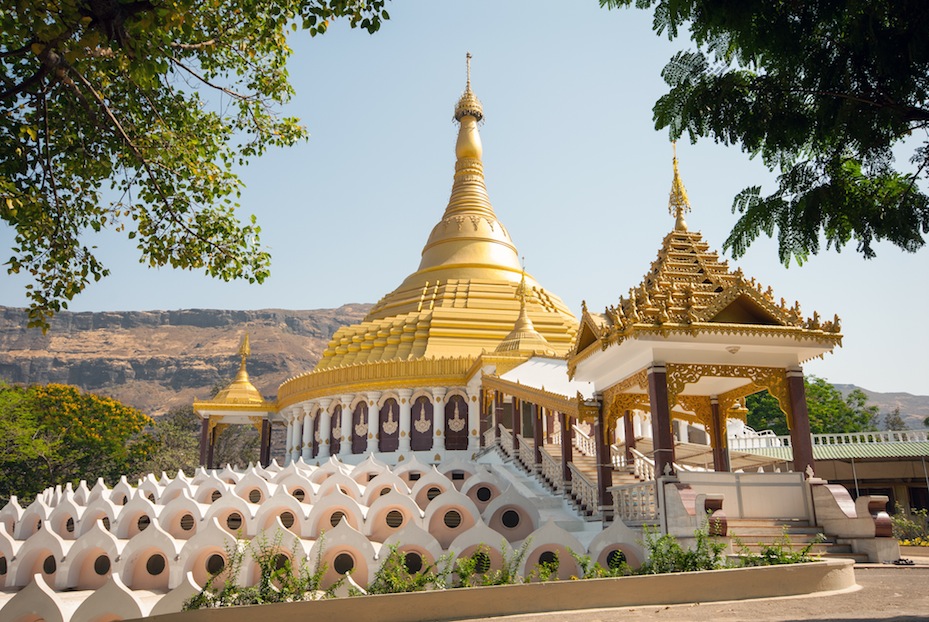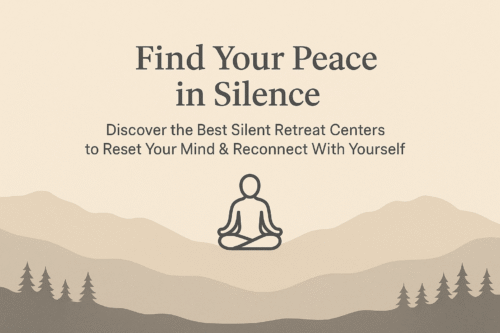Introduction: Why Silent Retreats Matter Today
Recharge. Reset. Return stronger.

A silent retreat is one of the most powerful ways to calm a busy mind and reconnect with your deeper self. In a world filled with constant notifications, deadlines, and pressure, silence becomes a rare luxury. For professionals, business owners, and wellness seekers, the mind often stays active even when the body tries to rest.
This is why a silent retreat matters. It helps you slow down your thoughts, reduce emotional overload, and release stress in a natural, gentle way. By stepping away from noise and entering a peaceful environment, you allow your mind to reset, recharge, and realign with your inner strength.
If you’re ready to find clarity and balance, this guide will help you explore the best silent retreat centers to achieve peace of mind—places designed to help you unwind, breathe deeply, and reconnect with your inner calm.
Why Choose a Silent Retreat for Peace of Mind?
A silent retreat is more than a break. It is a reset.
Here’s what silence can do for you:
- Reduce stress and anxiety
- Improve mental clarity and focus
- Enhance emotional strength and resilience
- Boost creativity and decision-making power
- Align your mind with your body
- Help you reconnect with your deeper purpose
If you’re building a wellness lifestyle, pair your retreat experience with Why Breakfast Nutrition is Important to Healthy Living to maintain a healthier routine.
For nature lovers, silent retreats combine inner stillness with peaceful landscapes — mountains, forests, rivers, and open sky. You may also enjoy reading Enjoy the Nature for inspiration.
Top 3 Silent Retreat Centers to Achieve Peace of Mind
1. Dhamma Giri Vipassana Center, Igatpuri (Maharashtra)

If you want a transformative and disciplined silent retreat, Dhamma Giri is one of the strongest choices. It is one of the world’s largest Vipassana meditation centers, nestled among the hills of Igatpuri.
Location & Google Map
Address: Dhamma Giri, Vipassana International Academy, Igatpuri 422403, District Nashik, Maharashtra, India.
Staying Facilities & Retreat Experience
- Retreat type: Standard 10-day residential Vipassana retreat with noble silence.
- Accommodation: Simple, clean rooms and dormitory-style housing, segregated by gender, designed for a distraction-free stay.
- Food: Nutritious vegetarian meals served twice daily, with tea breaks. Meals are included as part of the course.
- Schedule: Highly structured timetable starting around 4:00 am, with about 10 hours of daily meditation (sitting and walking) and evening discourses.
- Silence: “Noble Silence” — no talking, no eye contact, no gestures, and no use of phones or devices.
- Charges: Courses are offered on a donation basis. There are no fees for food, stay, or teaching; students donate voluntarily after completing a course if they wish.
- Environment: Large pagoda with individual meditation cells, gardens, and quiet walking paths surrounded by hills.
Before choosing a 10-day course, you may find this guide useful: Ten Days’ Silent Meditation Retreat.
Best for: Busy leaders, entrepreneurs, and serious meditators ready for a deep internal reset and a highly disciplined environment.
2. Amrita Silent Retreats, Amritapuri (Kerala)

If you prefer a silent retreat that blends peace, yoga, and gentle spirituality, Amrita Silent Retreats at Amritapuri are a beautiful choice. The retreats are based in Amma’s ashram, near the backwaters of Kerala.
Location & Google Map
Address: Amritapuri Ashram, Amritapuri P.O., Vallikavu, Karunagappally, Kollam, Kerala 690546, India.
Staying Facilities & Retreat Experience
- Retreat type: Residential silent and meditation retreats with options like 1-day, 3-day, 5-day, 9-day, and longer immersions (sometimes month-long).
- Practices: Includes sitting and walking meditation using Amma’s MA-OM technique, guided and silent sessions, Amrita Yoga, satsang (spiritual talks), scriptural study, chanting, and prayer.
- Accommodation: Ashram-style rooms (shared and sometimes single), with basic yet comfortable facilities suitable for Indian and international visitors.
- Food: Vegetarian food with multiple options — Indian canteens and Western-style café options (such as simple continental dishes, snacks, and good coffee) for added comfort.
- Atmosphere: Peaceful coastal environment with backwaters, temples, and meditation halls; strong devotional and community energy.
- Languages: Translations are often available in several languages for international retreatants.
- Charges: Reasonable daily contribution for stay and food. Some programs may have fixed retreat fees; details are usually provided when you register.
If you struggle with body stiffness from long working hours, you may like The Benefits of Neuro Yoga | Brain-Body Healing & Mental Clarity before you attend.
Best for: Health-conscious individuals, nature lovers, and professionals seeking mind–body wellness without extreme austerity.
3. Brahma Kumaris Silence Retreat Centre (Mahadevpuram, near Hyderabad)
For those who want peace without a very strict or intense schedule, the Brahma Kumaris Silence Retreat Centre offers a soft, supportive approach to silence and inner work.
Location & Google Map
Address: Brahma Kumaris Silence Retreat Centre, Mahadevpuram Village, near Bibinagar, approximately 34 km from Secunderabad, Telangana, India.
Staying Facilities & Retreat Experience
- Campus: About 3 acres of peaceful, green land designed as an “oasis of silence” — away from city noise and rush.
- Structures: Includes Tapasya Dham and other meditation halls, spiritual museum spaces, and quiet areas for contemplation.
- Accommodation: Simple, comfortable rooms with basic facilities; capacity typically around a few dozen participants at a time.
- Food: Pure vegetarian meals prepared in sattvic style, supporting a calm and light state of mind.
- Practices: Rajyoga meditation, guided commentaries, reflective exercises, silence periods, nature walks, and sessions on values and work–life balance.
- Schedule: Less intense compared to a Vipassana course; more breaks and reflective time, making it approachable for beginners.
- Charges: Often run on a low-cost or donation basis. Many Brahma Kumaris programs focus on service rather than commercial retreat pricing.
Beginners will also benefit from reading Self-Discipline & Procrastination to prepare mentally for quiet time.
Best for: First-time retreat participants, overwhelmed professionals, and those wanting a gentle, heart-centered environment to experience silence and reflection.
How to Choose the Best Silent Retreat for You
Match the Retreat to Your Current Life Situation
- If you want an intense transformation, Choose Dhamma Giri Vipassana.
- If you want silence + yoga + gentle spirituality: Choose Amrita Silent Retreats at Amritapuri.
- If you want a beginner-friendly, soft approach, Choose Brahma Kumaris Silence Retreat Centre.
You can also check out the 5 best yoga mats for yogi-2025-reviews and buying guide to support your meditation practice during or after the retreat.
Other Factors to Consider
- Duration: 1–3 days for a taste, 7–10 days for deeper work, longer if you’re ready.
- Intensity: Highly structured Vipassana vs. softer, more flexible retreats.
- Location: Mountains, coastal backwaters, forest, or rural countryside.
- Budget: Donation-based centers vs. fixed-fee retreats.
- Goal: Stress relief, emotional healing, spiritual growth, or decision clarity.
The Benefits of Silent Retreats for Busy Professionals
Professionals often say that a silent retreat gave them more clarity than any holiday.
Here’s why:
- Silence clears mental fog and reduces overthinking.
- New ideas and solutions begin to surface effortlessly.
- Emotional balance improves; you react less and respond more.
- Decision-making becomes sharper and more grounded.
- Sleep quality improves naturally.
- Anxiety levels drop, even after you return home.
- Productivity increases because your mind is no longer overloaded.
To keep the benefits alive, combine your retreat with the Benefits of walking and walking with Nature.
What to Expect in a Silent Retreat
Every retreat is different, but most silent retreats to achieve peace of mind share some common elements:
- No talking, texting, or social media.
- No TV, music, or external entertainment.
- Early morning meditation sessions.
- Guided and silent meditation blocks.
- Mindful walking in nature or within the campus.
- Simple, healthy vegetarian meals.
- Emotional release and deeper self-reflection.
- A much calmer, clearer mind by the end of the retreat.
Silence may feel challenging at first. But by the third day, your mind often starts to settle like still water, and you begin to feel what peace of mind truly means.
Frequently Asked Questions About Silent Retreats
1. What is a silent retreat?
A silent retreat is a structured program where you spend time in silence, away from distractions, while practicing meditation, yoga, or spiritual reflection under guidance.
2. Who should attend a silent retreat?
Silent retreats are ideal for busy professionals, business owners, health enthusiasts, and nature lovers who need clarity, rest, and inner reset.
3. How long should my first silent retreat be?
If it’s your first time, start with 1–3 days. Once you feel comfortable, you can choose a longer program like a 10-day silent Vipassana retreat.
4. Do I have to be experienced in meditation?
No. Many retreats are beginner-friendly and offer guided sessions. Start with Amrita or Brahma Kumaris if you feel unsure. Move to Vipassana when you’re ready for deeper work.
5. Are silent retreats safe?
Reputable retreat centers are generally safe, with clear rules, supportive staff, and guidelines. Always share any serious health conditions with organizers before attending.
Conclusion: Silence Is Not an Escape — It’s a Return to Yourself
A silent retreat is not an escape from life—it’s a return to your true self. When noise fades, clarity appears. When distractions disappear, inner peace becomes visible. Whether you choose a structured Vipassana retreat, a gentle yoga-based retreat, or a beginner-friendly peaceful center, the silence will guide you back to balance.
If your mind feels tired, scattered, or overwhelmed, this is your sign to pause. A few days in a silent retreat can unlock calmness, focus, and emotional strength you didn’t know you were missing.
Choose your retreat. Step into silence.
Your peace of mind is waiting for you.



